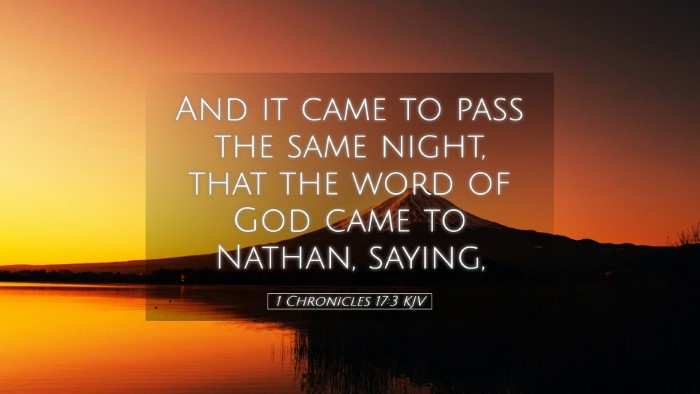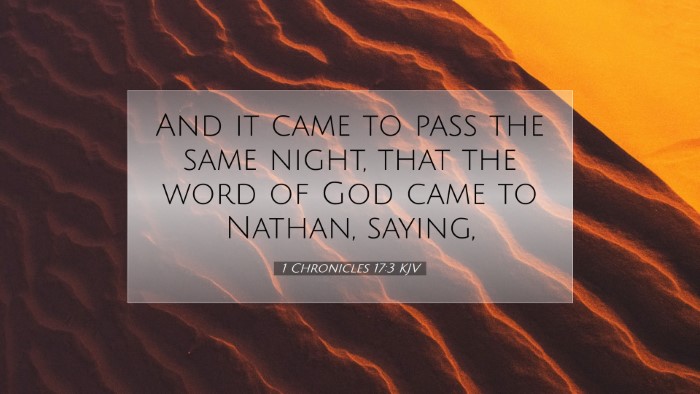Commentary on 1 Chronicles 17:3
Verse Context: 1 Chronicles 17:3 states, "But it came to pass that night, that the word of God came to Nathan, saying," (KJV). This passage marks a significant moment in the narrative of God's covenant with David.
Introduction
This verse serves as a critical juncture within the chronicler's narrative. It highlights not only the importance of prophetic revelation but also the intimate relationship between God and His chosen leaders. Through Nathan, God communicates divine intentions that are pivotal to the future of Israel.
Insights from Matthew Henry
Matthew Henry emphasizes the directness of God's communication to Nathan, indicating how essential it is for leaders to be in tune with divine revelation. He notes that God often chooses specific individuals, such as Nathan, to convey His will, ensuring clarity and purpose in leadership roles. Henry remarks on the significance of the timing of this revelation—that it came "that night." This suggests a sense of urgency and divine initiative in the matters concerning David's reign and God's plans for Israel.
Insights from Albert Barnes
Albert Barnes provides a detailed exploration of the nature of God's promise to David, considering the broader implications of God's covenant. He posits that the announcement to Nathan is indicative of God's ongoing relationship with His people and His intention to fulfill His promises. Barnes highlights how this prophetic moment signals a transition for Israel, heralding the establishment of a lasting dynasty through David—a theme that will echo throughout Scripture.
Insights from Adam Clarke
Adam Clarke expands upon the prophetic nature of Nathan's role, emphasizing how the Lord's word came to Nathan "that night." Clarke submits that this underscores the immediacy and importance of God's message, reflecting on the necessity for vigilant listening to God's voice among leaders. He points out that God's revelations often arrive unexpectedly, challenging leaders to be prepared and responsive to divine instruction, especially when it concerns the future of their people.
The Role of Prophecy
A significant theme within this verse is the role of prophecy in guiding God's people. The utterance of God's word to Nathan illustrates the critical function of prophetic ministry in ancient Israel. Divine communication is central to the narrative and serves as a reminder that God is actively involved in the affairs of His people. It stresses the importance of the prophetic office, as God employs individuals to convey His message and direct the course of human events.
The Importance of Divine Timing
The phrase "that night" carries profound implications. It not only speaks to the immediacy of God's intervention but also underscores the necessity for receptivity and readiness on the part of God's servants. God's timing is often perfect—arriving at moments of uncertainty and need. This serves as a reminder that spiritual leaders must be attentive and prepared to receive guidance from God, especially during critical junctures.
Theological Implications
This verse holds several theological implications for understanding God's behavior towards humanity. Firstly, it affirms God's sovereignty and His intimate involvement in the governance of His creation. Secondly, it establishes the concept of covenant, which is foundational in biblical theology. Through Nathan's message, God reaffirms His commitment to David, illustrating a divine plan that transcends the immediate historical context.
Application for Pastors and Leaders
For pastors and church leaders, 1 Chronicles 17:3 serves as an exhortation to cultivate a relationship with God that prioritizes seeking His will. It emphasizes the necessity for prayerful discernment when making decisions, recognizing that God speaks through various means. Moreover, leaders are called to ensure that their actions align with divine guidance, mirroring Nathan's role in communicating God's word faithfully.
Reflections for Theologians and Scholars
Scholars studying this text are encouraged to engage with the allusions to covenant theology, tracing the implications of David's kingship through the lens of God's promises. Exploring the historical context surrounding Nathan's prophetic word deepens the understanding of God's willingness to engage with humanity. The development of Israel's identity as God's chosen people is intricately connected to these covenantal moments and further enriches the narrative found in Chronicles.
Conclusion
In conclusion, 1 Chronicles 17:3 offers a wealth of insight into the nature of prophetic ministry, divine timing, and covenant theology. By drawing on the thoughts of Matthew Henry, Albert Barnes, and Adam Clarke, we see a multifaceted understanding of this pivotal moment in biblical history. Ultimately, this verse serves as both a historical marker and a theological foundation for understanding God's continued engagement with His people, inviting all to remain attentive to His voice.


